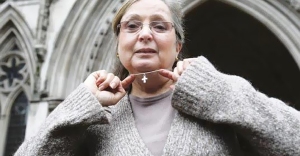Photo credit: www.urbanchristiannews.com
by Rick Plasterer
As noted in an earlier posting, the 2013 National Religious Freedom Conference held by the Ethics and Public Policy Center on May 30 indicated a long-term, intense struggle over religious freedom. In a noontime address, the Rev. Samuel Rodriguez, President of the National Hispanic Christian Leadership Conference, said that as a nation confronting the current attack on religious freedom “we’ve never been down this road before.” Currently, religious freedom in America must be recognized as an “endangered species.” Like State Rep. Hamilton noted in an earlier panel, he observed the phased arrival of religious persecution by saying that “a posture of complacency today will result in a position of captivity tomorrow.” America came from “the womb of religious freedom,” enabling the nation to confront slavery, and later segregation. The “faith narrative,” whether orthodox Christian or not, has informed the American nation thoughout its existence. American religious freedom has been characterized by the idea that “God is over man, and man is over government.” He said that “the antidote to religious totalitarianism is religious pluralism … and religious freedom serves as the proverbial firewall against secular tyranny.” He agreed with other speakers that religious believers of different religions need to stand together against secularist attacks on religious liberty. As an example of the kind of contemporary attacks on religious freedom, he noted that counselors in churches in California are threatened with legislation which would prohibit them from discussing Biblical sexuality. Concerted action is needed to protect religious freedom for future generations. “Without inter-faith cooperation, we will never be able to build that firewall against secular tyranny,” Rodriguez said. While the government may have earthly authority, it cannot have ultimate authority.
In a final panel of the day on threats to religious freedom in the U.S. and Europe, Hannah Smith of the Becket Fund for Religious Liberty observed some successes in religious liberty litigation. These included the decision of a Massachusetts state court that the phrase “one nation under God” in the pledge of allegiance does not violate the Massachusetts constitution, a judgment in favor of building a mosque in Murphreesboro, Tennessee, and a judgment by an Illinois appellate court that pharmacists cannot be legally required to violate their consciences by distributing abortion drugs. David Little, retired Professor of the Practice in Religion, Ethnicity, and International Conflict at Harvard Divinity School however noted the alarming new legal theory by contemporary legal scholars that society has no particular reason to give religious liberty special protection in law, particularly the claim that there should be no religious freedom if anyone else is “harmed.” Additionally there is the claim that religion should not be protected because it is “insulated” from evidence. This would really destroy religious freedom, since there is no point in the state protecting freedoms to do what offends no one. A similar argument about speech or personal action would make those activities illegal if anyone is offended, destroying free society. It is not surprising, therefore, that Dr. Little said that close analysis of some of this legal theory would make liberty of conscience possible to support personal autonomy.
Roger Trigg, Senior Research Fellow in the Ian Ramsey Centre at the University of Oxford noted that religious freedom trends in the British Isles are extremely bad, so much so that Catholics and Protestants, historically at odds with one another in the Republic of Ireland are now aligned to resist secularist assaults. On the European continent, pan-European institutions are causing secularism to become a major threat to religious freedom. Judges are defining core beliefs as excluding marriage or the wearing of crosses. On the issue of homosexuality, sexual orientation discrimination is judged a crime so heinous it must always override religious freedom. Religious beliefs are now held to be subjective, and no longer be prima facae evidence of a public good. He stated that in Europe “religious freedom is under attack, I suspect because religion is under attack.”
Given that the wide-ranging assault on religious freedom is international in scope and waged by legal scholars and secularist and cultural groups which act from conviction, an equally conviction based, persevering response is needed in the coming years. As the speakers at the conference noted, all persons of faith must realize that denials of religious liberty and liberty of conscience affect all, and they should respond in concert, as well as having as wide an ideological (left to right) coalition as possible, good funding, and courage. The assembly of legislators, religious leaders, and legal scholars at the 2013 National Religious Freedom Conference gave hope of such an intelligent and sustained effort.
No comments yet




